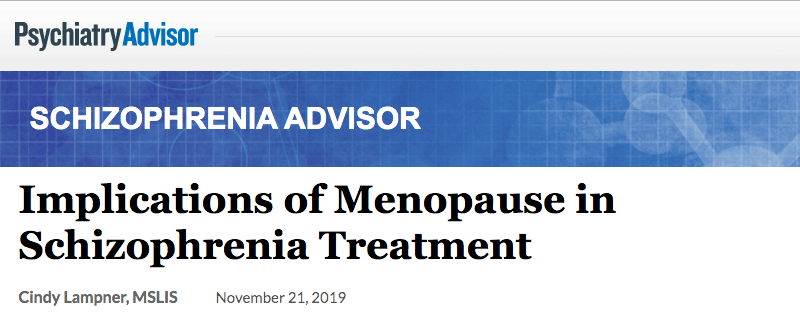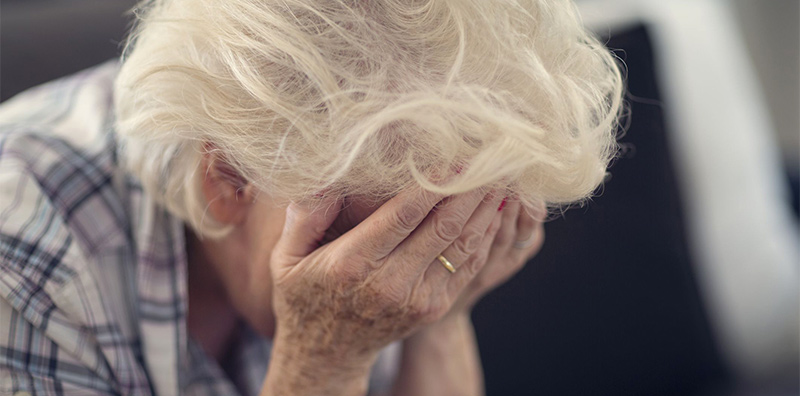


In patients with schizophrenia, endogenous estrogen might have a protective effect in symptoms becoming active.
Sex differences in the onset, symptoms, and course of illness in schizophrenia have long been noted. Such observations have led to the hypothesis that endogenous estrogen may have a protective effect against schizophrenia.1 In men, the age of schizophrenia onset peaks in those aged between 15 and 25 years, whereas in women, peak onset is in patients aged between 20 and 35 years, with a subsequent smaller peak around the time of menopause.2 In addition, women with preexisting schizophrenia frequently experience a postmenopausal exacerbation of psychotic symptoms and a resultant need for an increase in antipsychotic medication.3
In a recent review of the medical literature from 1990 to 2016 on the treatment of schizophrenia during menopause, Amnon Brzezinski, MD, from the Department of Obstetrics and Gynecology at The Hebrew University-Hadasssah Medical Center, Jerusalem, Israel, and colleagues concluded that hormonal therapy during perimenopause in women with schizophrenia may be used to ameliorate psychotic, cognitive, and affective symptoms. The authors also advised that modifications in the types, doses, and modes of administration of antipsychotic medication should be considered for women with schizophrenia at the time of menopause.3
To shed light on the treatment implications of menopause in patients with schizophrenia, Psychiatry Advisor interviewed Dr Brzezinski and review coauthor Mary Seeman, MDCM, FRCPC, DSc, professor emerita in the Department of Psychiatry at the University of Toronto, Ontario, Canada. Dr Seeman has written widely about the biopsychosocial differences between men and women in psychotic disorders.
Psychiatry Advisor: How do symptoms of schizophrenia change with menopause?
Dr Brzezinski: Women with schizophrenia experience the same vasomotor, physical, cognitive, sexual, and psychosocial symptoms as other women at menopause. However, the symptoms are often aggravated by adverse factors closely associated with schizophrenia, such as poverty, substance abuse, homelessness, loneliness, lack of occupation, and adverse effects of antipsychotic drugs. Recent studies have confirmed that women with schizophrenia and their family members perceive menopause as being associated with both worsening symptoms and quality of life. Psychotic symptoms of schizophrenia such as hallucinations and delusions become active as women approach menopause. This is clinically meaningful because in men, at the corresponding age, these symptoms generally become quiescent.
Dr Seeman: In many women, psychotic symptoms such as hallucinations and delusions worsen at the time of menopause, when estrogen levels fall. Higher doses of antipsychotics are often required, and this can result in greater severity of adverse effects of the drugs. What also happens in some women is that oral drugs appear to lose their effect, so long-acting intramuscular drugs are required.
Psychiatry Advisor: What are the important issues that psychiatrists should consider when treating schizophrenia in menopausal or postmenopausal women? Are there specific therapeutic approaches that should be used for women in that stage of life?
Dr Brzezinski: Around the time of menopause, women with schizophrenia often require antipsychotic dose increases. This is because several changes occur in the absorption and metabolism of drugs at the time of menopause. It has been reported that the variability in drug response that exists among individuals with psychosis increases at menopause and is greater for the oral route that goes through the liver than for intramuscular injection. This may be why, for some women with schizophrenia at this time of life, oral medications appear to lose effectiveness, whereas depot injections of the same antipsychotic continue to be effective.
Dr Seeman: Quite apart from schizophrenia, this time of life is often difficult for women: night sweats, insomnia, urinary problems, sexual problems, and weight gain increase the risk for metabolic and cardiovascular problems. It is difficult psychologically for many women because it is symbolic of loss of fertility and a perceived loss of sexual desirability. It can also coincide with the loss of parents to illness and death or children moving away. There may be care responsibilities for parents or other elderly relatives. Psychiatrists need to be aware of this, as well as of the effects of estrogen on psychotic symptoms. They may want to discuss hormone replacement or refer their patient to a gynecologist for this discussion.
Psychiatry Advisor: What is the current status of hormonal therapy as a treatment for schizophrenia in menopausal women? Is this a current clinical strategy? Or is it experimental?
Dr Brzezinski: Estrogen therapy, with or without progesterone, and raloxifene treatment have been shown to have beneficial effects on the physical, cognitive, and psychotic symptoms of many women with schizophrenia. As with women in the general population, hormone therapy should be offered early after the start of menopause, and potential hazards such as breast and cardiovascular changes need to be monitored.
Dr Seeman: Many women, whether or not they suffer from schizophrenia, benefit from hormone replacement therapy, which is recommended for symptomatic women and is considered safe for the first 5 years of menopause or longer. The still experimental part is whether or not it will improve schizophrenia symptoms as well as other estrogen deficit symptoms. The current evidence is that it will, at least for some women.
References
1. Riecher-Rössler A, Häfner H. Schizophrenia and oestrogens — is there an association? Eur Arch Psychiatry Clin Neurosci. 1993;242(6):323-328.
2. Mendrek A, Mancini-Marïe A. Sex/gender differences in the brain and cognition in schizophrenia. Neurosci Biobehav Rev. 2016;67:57-78.
3. Riecher-Rössler A. Psychotic Disorders and Menopause: The Untold Story. In: Soares CN, Warren M, eds. The Menopausal Transition. Interface Between Gynecology and Psychiatry. Key Issues in Mental Health. Basel: Karger;2009:115-126.
4. Brzezinski A, Brzezinski-Sinai NA, Seeman MV. Treating schizophrenia during menopause. Menopause. 2017;24(5):582-588.